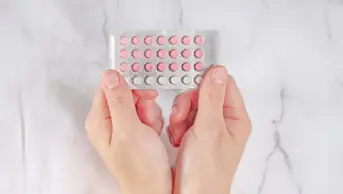
Shutterstock.com
A study using data from more than 250,000 women has revealed that taking the combined contraceptive pill is associated with a 71% higher risk of developing depression during the first two years.
The study, published in Epidemiology and Psychiatric Sciences on 12 June 2023, and thought to be one of the biggest of its kind, used UK Biobank data from 264,557 women from birth to menopause, of whom 81% had taken combined contraception containing progestogen and oestrogen at some point in their lives.
According to the researchers, from Uppsala University in Sweden, previous evidence of a link between oral contraception and depression showed inconsistent findings, possibly owing to women who experience poorer mental health stopping the contraception, resulting in healthy user bias.
Analysis revealed that the first two years of oral contraception use were associated with a higher rate of depression compared to people who had never used oral contraception (hazard ratio [HR] = 1.71, 95% confidence interval [CI]: 1.55–1.88).
Although the risk was not as pronounced beyond the first two years, taking oral combined contraception at some point in their lives was still associated with an increased lifetime risk of depression for women (HR = 1.05, 95% CI: 1.01–1.09).
Previous oral contraception use was associated with a higher rate of depression compared to people who had never used oral contraception, with adolescent oral contraception users driving the increased hazard (HR = 1.18, 95% CI: 1.12–1.25).
Therese Johansson, a PhD student at the Department of Immunology, Genetics and Pathology at Uppsala University, who co-led the study, said: “Although contraception has many advantages for women, both medical practitioners and patients should be informed about the side effects identified in this and previous research.
“The powerful influence of contraceptive pills on teenagers can be ascribed to the hormonal changes caused by puberty. As women in that age group have already experienced substantial hormonal changes, they can be more receptive not only to hormonal changes but also to other life experiences.”
Johansson added: “It is important to emphasise that most women tolerate external hormones well, without experiencing negative effects on their mood, so combined contraceptive pills are an excellent option for many women.
“Since we only investigated combined contraceptive pills in this study, we cannot draw conclusions about other contraceptive options, such as mini pills, contraceptive patches, hormonal spirals, vaginal rings or contraceptive rods. In a future study, we plan to examine different formulations and methods of administration.”
Commenting on the findings, Zoe van Zuylen, a research pharmacist at Imperial College Healthcare NHS Trust, said: “It is great that there are an increasing number of studies that are taking women’s issues seriously, including examining issues that have traditionally been dismissed.
“It is important to consider the implications within the context of the study, it is only a part of the story and this is an incomplete picture.
“Reliable contraception is a very important healthcare need and women on established treatment should not stop contraception without having adequate pregnancy prevention plans in place.
“Further work is required to truly understand the importance of this finding.”


